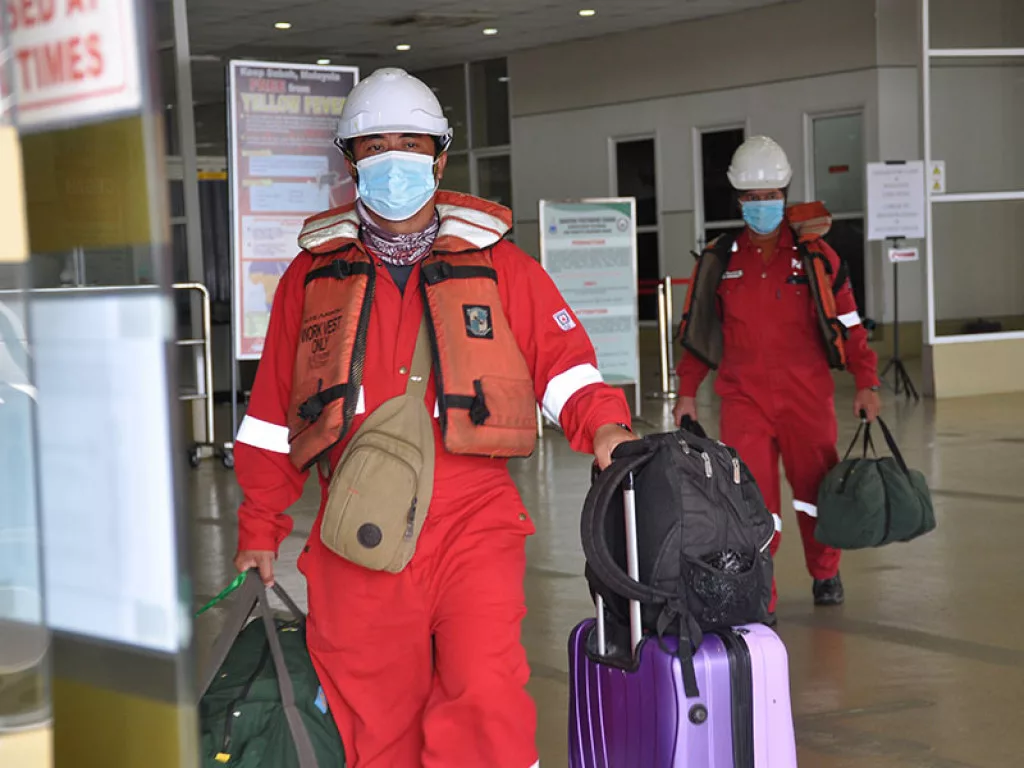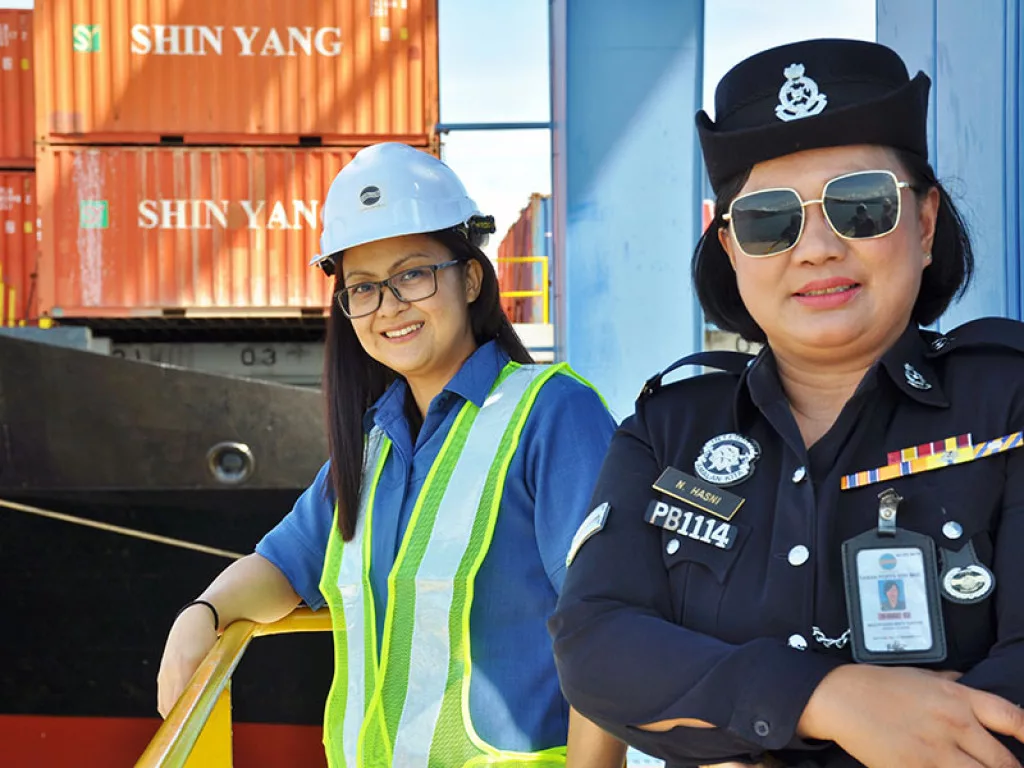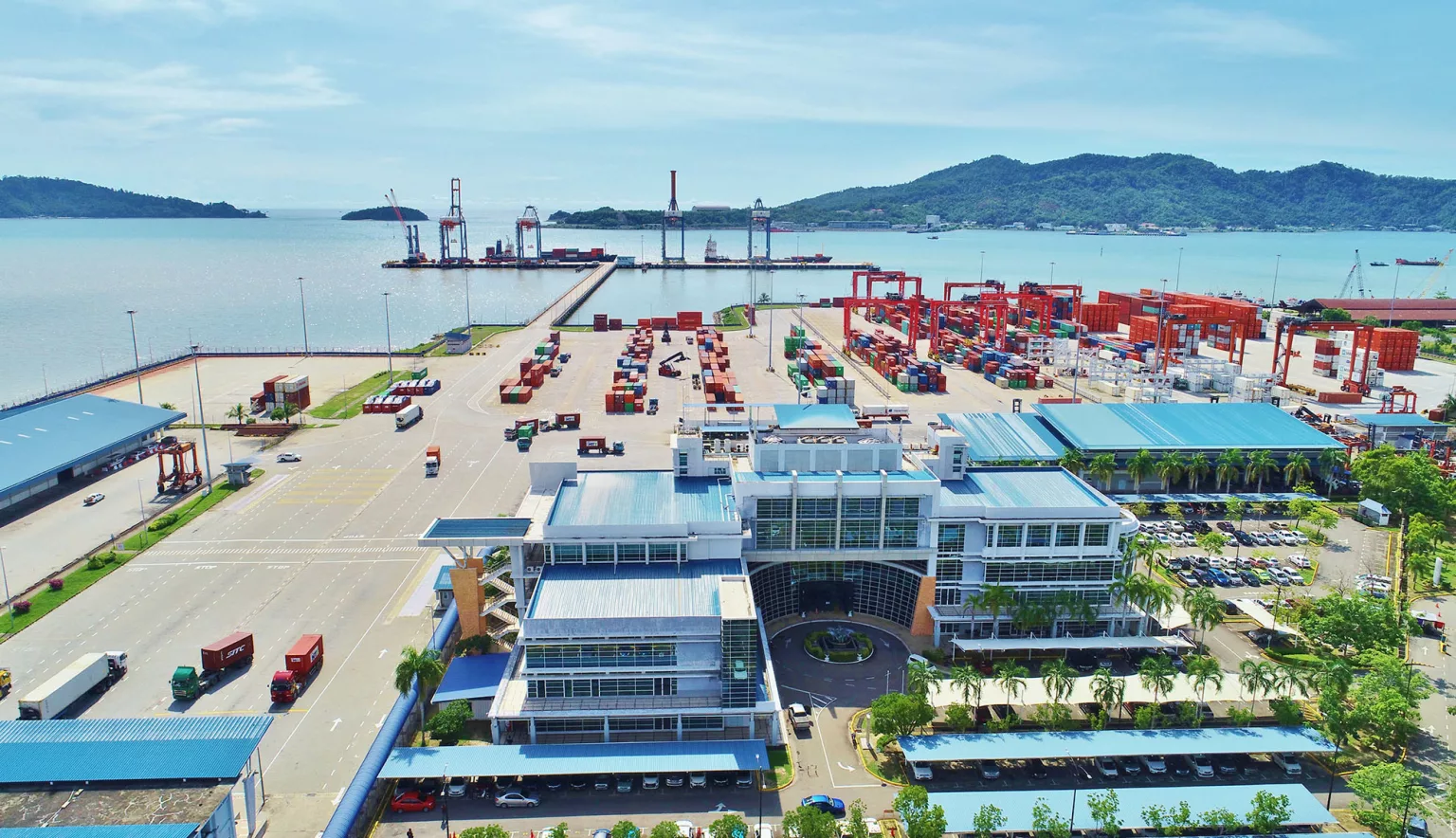Port operations in the Malaysian state of Sabah have been managed by Sabah Ports Sdn Bhd (SPSB) since 2004. Datuk Ng Kiat Min, Group Managing Director of Suria Capital Holdings Berhad, delves deep into the success of the subsidiary and the wider state.
GATEWAY TO THE FAR EAST
Sabah is famed for the iconic 4,095-metre-tall Mount Kinabalu, Malaysia’s highest peak renowned worldwide for its tremendous biodiversity and crowned with its distinctive granite spires.
Against the majestic backdrop of Mount Kinabalu, it is all the way down at sea level where Sabah Ports Sdn Bhd (SPSB) provides berthing, handling and cargo facilities to customers across eight ports located to the east and west of Sabah.
It has done so since 2004, when SPSB officially took over the management of all port operations from the Sabah Ports Authority in Malaysia, a country in which maritime transport accounts for almost 90 percent of international trade.
As the state’s main port operator, SPSB, a wholly owned subsidiary of Suria Capital Holdings Berhad, has welcomed the world to the shores of East Malaysia’s golden gateway, delivering maritime logistics, access and opportunities to Sabah.
“Most Malaysian ports adopt a model whereby one operator or authority manages a single port; however, it is quite different with us as we manage multiple ports across the state,” says Datuk Ng Kiat Min, Group Managing Director at Suria Capital Holdings Berhad.
“By being the sole operator and manager of the eight main ports in Sabah, it has enabled us to achieve better coordination, planning and synergy among our ports.”
The state of Sabah is on the right trajectory for growth, and recent developments have proven that it has the potential to evolve as an investment hub and a centre for manufacturing and industrial activities.
Significant major foreign investment from SK Nexilis, a global leader in copper foil production, is evidence of this potential, with the Korean-based company choosing to set up its first overseas production base at the Kota Kinabalu Industrial Park in Sabah.
The investment bodes well not only for the state of Sabah, but also SPSB, who will further benefit from 50,000 tonnes of export cargo annually as a result of SK Nexilis’ new base.
“With the entry of SK Nexilis, I am optimistic that it will entice other multinational corporations (MNCs) to follow,” Ng Kiat Min says confidently.
“What Sabah Ports has achieved today is reflective of two decades of growth”
Datuk Ng Kiat Min, Group Managing Director, Suria Capital Holdings Berhad
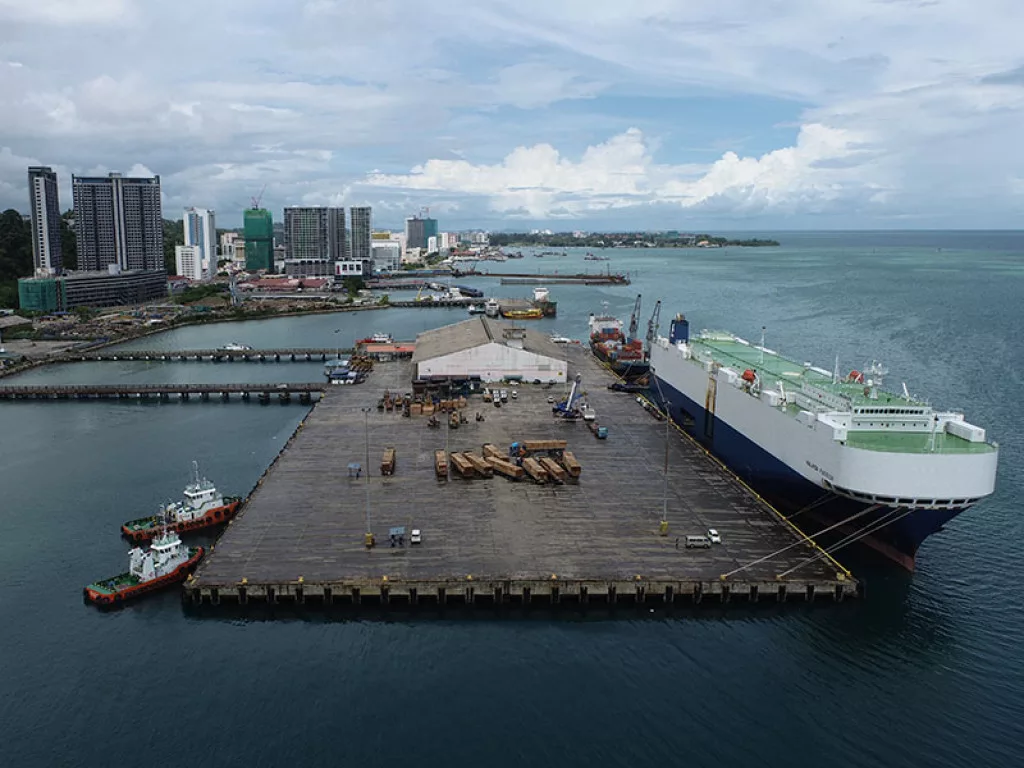
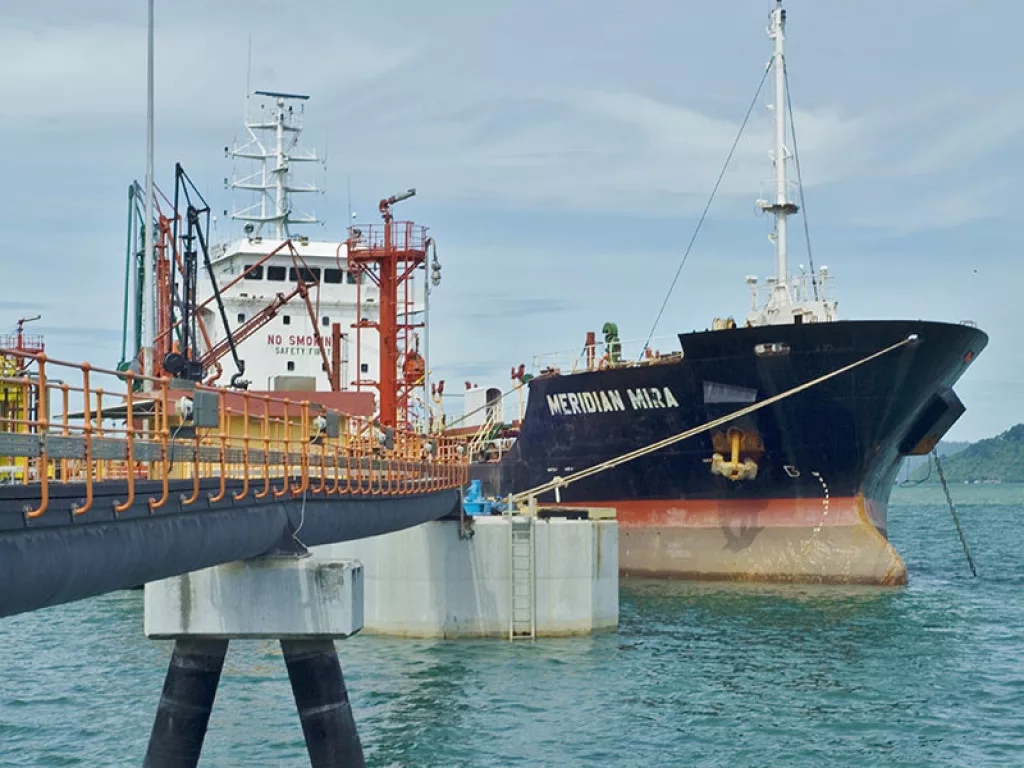
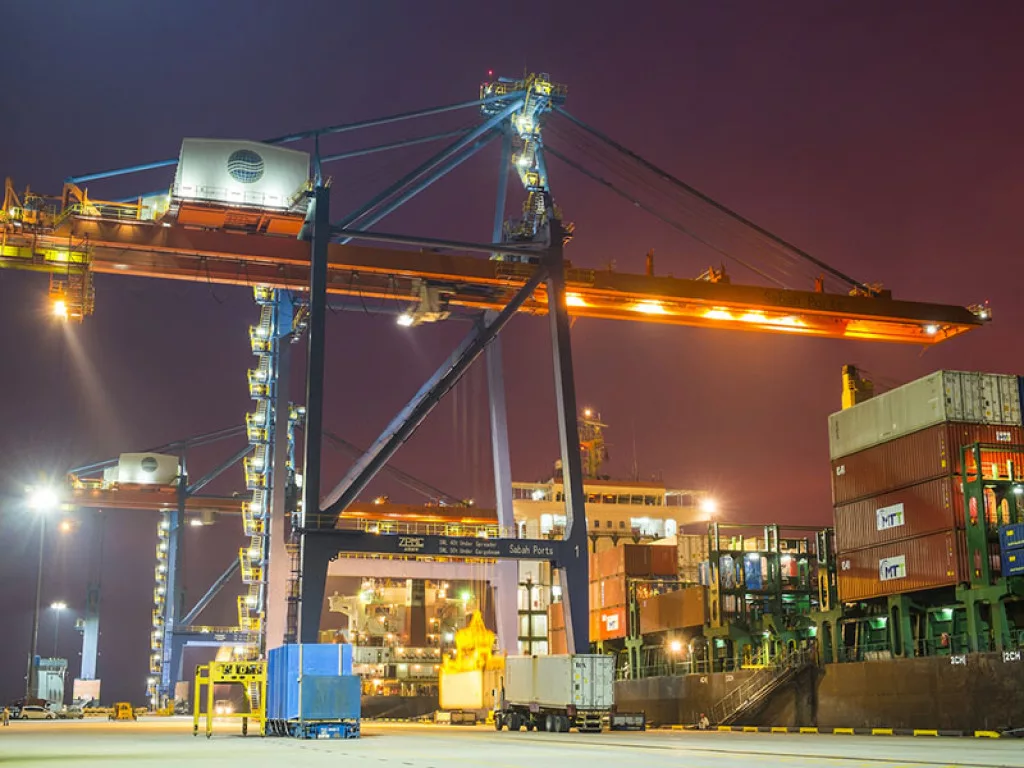
DRIVING GROWTH
The expansion of the Sapangar Bay Container Port (SBCP), meanwhile, has been identified as a major thrust in revitalising industrial activities in Sabah.
A port of international standing, SBCP is strategically located along busy shipping routes between the Far East and Europe, positioned as the premier transhipment hub for the Brunei Darussalam-Indonesia-Malaysia-Philippines East ASEAN Growth Area (BIMP-EAGA).
“SBCP has the potential to become the focal point of the BIMP-EAGA shipping cluster,” says Ng Kiat Min. “It is SPSB’s aim to designate SBCP as a regional hub for containerised cargo from BIMP-EAGA, as well as the Association of Southeast Asian Nations (ASEAN).”
Funded by the Malaysian government, SBCP’s major expansion will upgrade its jetty length, handling capacity, as well as commissioning reclamation works, boosting the port’s handling capacity from 500,000 TEUs to 1.25 million TEUs per annum.
“We need to work closely with each of our strategic partners, who can all play a role in maximising SBCP’s potential,” Ng Kiat Min emphasises. “SBCP will be game-changing and seen as a driver of economic growth for the BIMP-EAGA region, whilst providing the impetus to encourage manufacturing and industrial activities in Sabah.”
It comes as part of SPSB’s five-year development plan which also includes a jetty extension at the Sapangar Bay Oil Terminal (SBOT), whose capabilities are being upgraded to accommodate larger tankers and thereby greater volumes.
The extension entails the construction of an additional jetty, incorporating two extra berths designed to handle two vessels at once. More importantly, the new jetty will allow pipeline maintenance works to be carried out more efficiently side by side, without interrupting operations or compromising safety.
“SBOT will be able to cater for more vessels, and the twin jetties will enable 60,000 DWT vessels to be accommodated which is double the current capacity,” explains Ng Kiat Min. “Currently, it handles an average volume of 1.2 million tonnes of bulk oil on an annual basis, serving oil majors such as Shell, Petron and PETRONAS.”
As part of the long-term development plan, general cargo operations currently handled at Kota Kinabalu Port will be relocated to the Sapangar Bay area, paving the way for a mixed development project being undertaken by Suria Capital Holdings Berhad to transform it into a prime commercial zone.
To this end, SPSB will embark on the construction of a general cargo port by the name of Sapangar Bay Conventional Cargo Terminal (SBCCT) to enable general cargo operations, infrastructure and facility requirements.
With the relocation of general cargo from Kota Kinabalu to Sepangar, SPSB also plans to create the Sapangar Bay Integrated Port (SBIP) which is expected to encourage industrialisation and manufacturing growth, thus laying the foundation for a free trade zone and other economic activities to take place in the area.
“Our plans have a specific focus on catering for the future and enabling enhanced connectivity for trade to reach global markets. We hope to play a role that brings more investments and ultimately elevates Sabah as an attractive investment destination,” Ng Kiat Min says.
“By being the sole operator and manager of the eight main ports in Sabah, it has enabled us to achieve better coordination, planning and synergy among our ports”
Datuk Ng Kiat Min, Group Managing Director, Suria Capital Holdings Berhad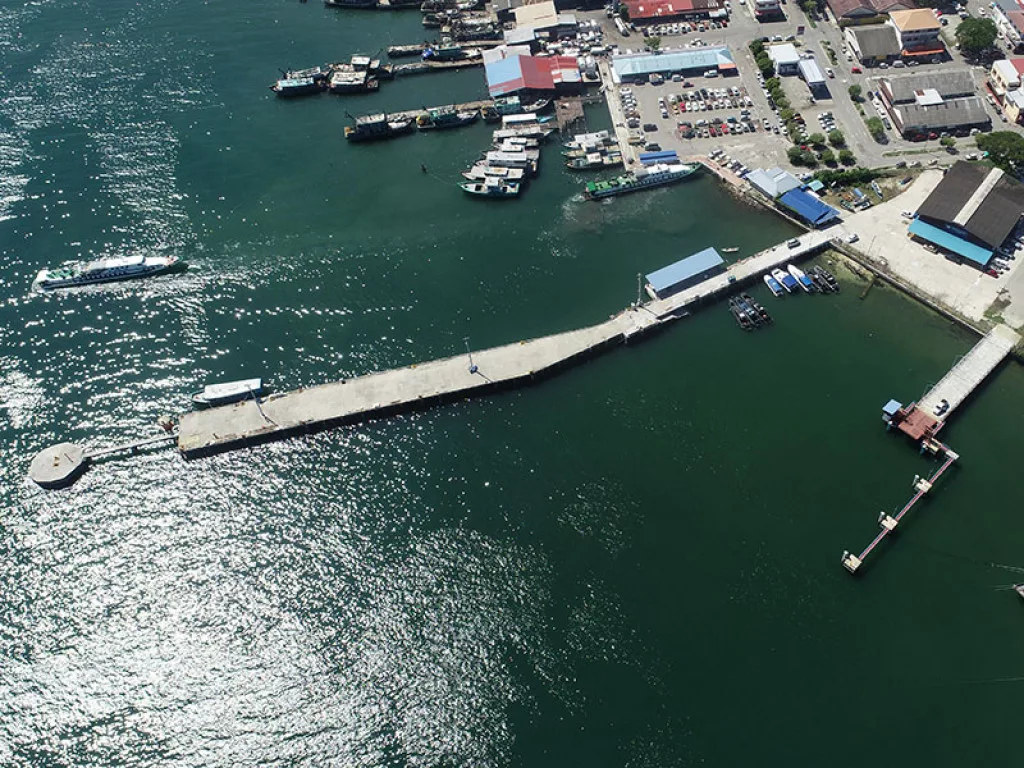
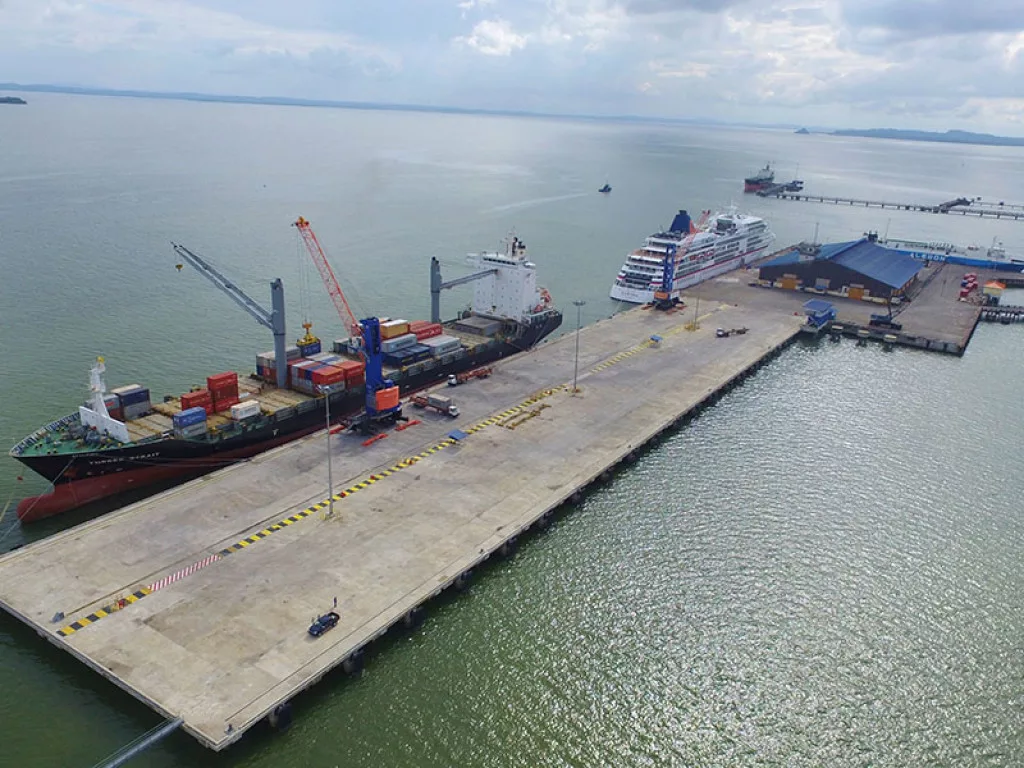
FUTURE OPPORTUNITIES
SPSB, whose 1,000-strong workforce follow developments in the BIMP-EAGA region closely, has been bolstered by the news that Indonesia is moving ahead with plans to relocate its capital from Jakarta to Kalimantan, an Indonesian territory neighbouring Sabah on the island of Borneo.
A deadline of 2024 has been set for the move to Kalimantan, which will undeniably benefit Sabah and especially SPSB’s east coast ports. Tawau Port, for instance, has a long history of trade with Indonesia and is considered a main avenue for Indonesian exports to enter Sabah.
Sabah and North Kalimantan in particular not only share extensive land and maritime borders, but significantly, they complement each other economically.
“Maritime-wise, the vision for North Kalimantan’s Tarakan Island is to develop it into a cross-border gateway, mainly through seaborne and airborne transport, whilst Tarakan City is recognised as the main distribution point for cargo shipping,” notes Ng Kiat Min.
“There will be many areas of economic spill-over once the relocation materialises, so Sabah should be prepared for the future and seek opportunities for collaboration that will benefit both sides.”
Further, Sabah offers ample opportunities for the oil and gas industry, with the state also ideally positioned along the trading routes of vessels plying between Australia and East Asia.
For this very reason, SPSB has capitalised to provide integrated marine services, with the company making its first foray into LNG bunkering operations in October 2021 after being appointed as the main service provider for Malaysian national energy giant, PETRONAS.
“The venture signifies the upgrading of services offered by SPSB, and in the long run, we aim to offer a one-stop solution with a range of marine services for the industry,” outlines Ng Kiat Min.
POSITIVE IMPACT
Among SPSB’s other key priorities is its commitment towards building a green, sustainable port, the principles of which are becoming increasingly important and form part of the company’s development.
Guided by Environmental, Social, and Corporate Governance (ESG), on top of the UN’s Sustainable Development Goals, SPSB’s goal is to ensure it is contributing effectively and making a positive impact.
This goal is already being achieved, with the APEC Port Service Network (APSN) recognising SPSB’s active engagement in ecological conservation through projects such as seagrass transplantation, mangrove restoration, and marine rehabilitation projects in 2019.
A year later, SPSB was rewarded for its green initiatives at the Asia Corporate Excellence and Sustainability Awards, which acknowledged the company’s use of natural resources as well as reduced energy consumption and carbon emissions in port business operations.
“In the future, we have plans to introduce port reception facilities to ensure proper waste management for vessels coming into our port,” Ng Kiat Min reveals.
Together with an active support for employee development and gender equality, it is clear that SPSB has evolved in many areas since taking over port management operations from the Sabah Ports Authority in 2004.
“What Sabah Ports has achieved today is reflective of two decades of growth,” concludes Ng Kiat Min.
